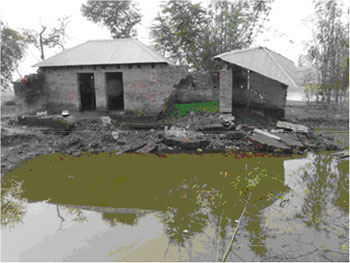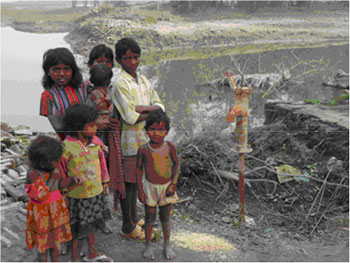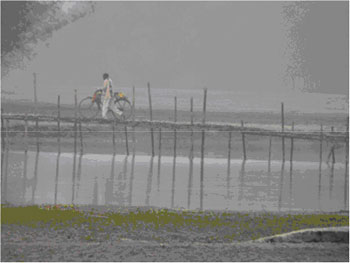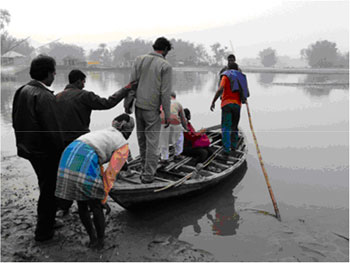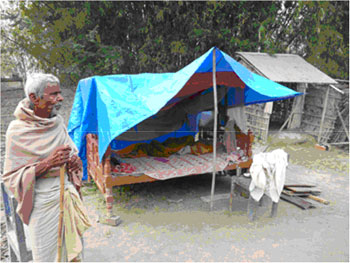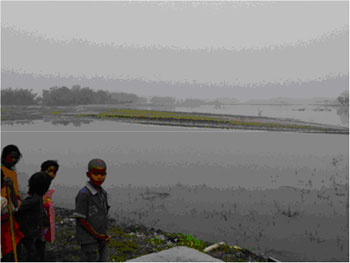Past Interventions
BIHAR FLOODS (2008) — RELIEF AND REHABILITATION
(I) Background (September, 2008)
Owing to rampant and organized corruption anything that goes wrong in Bihar today is met with a disparaging cynical shrug of the shoulder. Unfortunately nature has conspired to create a situation which has setback the lives of lakhs of people. The debate on whether the floods and havoc caused by the Kosi river was manmade and avoidable will no doubt rage for months to come but there can be no doubt that this was a catastrophe of epic proportions.Based on our experience of the 1999 Orissa super cyclone and the 2004 tsunami we believe that in the unlikely event that everything promised is executed perfectly, there will still be plenty of gaps.
The Kosi River breached its embankment on the Nepal border in the third week of August, 2008 and wreaked havoc on the North-Eastern districts of Bihar, with Araria, Madhepura and Supaul being the worst affected.
This was not a natural disaster but man made (through negligence) and areas which had not seen floods for over fifty years were submerged under 15 to 20 feet of swirling waters. Villagers were compelled to move into government-run camps where they received food and scanty shelter. With the waters receding the camps were closed at the end of October and the government provided ‘compensation’ amounting to Rs.2250 in cash and 100 kg of grain. On a positive note, the level of corruption had gone down, the ‘commission’ on the cash amount was only Rs100 – 250 though the shortage in the grain supplied was 20 to 30%. This disbursement was followed by a deafening silence from the government, with the affected people left on their own to pick up the pieces of their lives.
(II) Initial Intervention strategy (September, 2008)
Volunteer groups based in Patna have been providing immediate succour to affected families. Working in the bordering areas of Araria and Supaul districts 2500 food packets and clothing have been supplied at a cost of around Rs. 4,00,000. Subject to availability of funds the plan was to continue to provide assistance over the next three months. Besides large and infrastructural requirements, the needs that will not be met by government assistance have been assessed as:
1) cooking utensils
2) protective covering for winter in the form of thick sheets/blankets
3) bleaching powder and basic medicines for colds, fever and gastric ailments
(III) Field Visit 100 days after the disaster (December, 2008)
We visited Pratapnagar village, one of the flood affected area in Murliganj block of Madhepura district. We noticed that some flood affected areas were limping back to normalcy but the situation in many villages were still desperate and growing worse as time pass and the memories of the disaster faded from the mind of the government and common people.
The Ground Reality in Pratapnagar :
- The village is not only surrounded on all sides by water but have been quartered by the water running through. Communication between the four wards thus created is by country boat.
- The paddy crop was lost entirely and most of the land were still completely submerged. Only 10% landowners will be able to sow the winter crop.3. The ‘compensation’ provided by the government has been exhausted and several families had no rice or roti and were surviving on fish whenever they could make a catch.
- Of the 1000 families around 50% have lost their homes. Only a few have managed to reconstruct or repair their dwelling and sleep virtually exposed to the elements.
- There has been a large scale loss of livestock and the surviving animals are facing an acute shortage of fodder.
- Even though the damage to the school buildings have not been extensive, school have not restarted. Besides schooling the children were deprived of their mid day meal.
- Several of the village hand pumps no longer work; there is no provision for medical aid and the people are dispirited, psychological wrecks who have lost everything. In the words of one villager ” Hamarey dimak ka bulb fuse ho gaya”
Our Response :
1.1600 blankets will be distributed in the coming week
2.Rations will be provided to those without any grain
3.Fodder will be arranged and sent from Patna.
We will develop a ‘Food for Work’ programme so that the villagers can rebuild their homes. (The main raw material, bamboo, is easily available here.)These are short term, interim measures but after our visit we decided that a longer term association is required so that some degree of rehabilitation can be achieved. For this purpose two activists from Gaya decided to relocate themselves there and join hands with two local youth to spearhead the effort. What we hope to achieve through this intervention are;
- Large scale mobilization of the people to pressurize the government.
2. Demand work under the NREGA (Mahatma Gandhi Employment Guarantee Act 2005) which would provide income to each family while simultaneously rebuilding the village. - Get schools to restart immediately
- Secure a long-term source of fodder
- Arrange medical assistance for the people and their animals
- Explore alternate livelihoods for those whose land is going to remain submerged.We decided to provide financial support for the core group to meet their living expenses as long as they are engaged in the effort. (IV) Pratapnagar Navnirman Abhiyan (March 2009)
‘Pratapnagar Navnirman Abhiyan’ was established on 14th Feb 2009. About 600 people participated in the function for the formation of the organization, 50% of the participants were women.The organization consisted of 900 families. A relief operation was undertaken for flood victims of Murliganj village by Atmashakti Trust, Janmukti Sangharsh Vahini with the help of Koshi Navnirman Manch who distributed the relief materials the village.
- Out of 1700 blankets, 972 blanket were distributed in Murliganj and rest were distributed in other villages during December 2008 to January 2009.
2. Packets of 12 kg. food grain were distributed among 526 families in Murliganj in the 1st week of Jan 2009. - During relief work, they realized that a permanent set up should be formed to rebuild the ruined villages during flood with the help of government agencies and other helping hands.
- Manmohan Singh and Ruchi Kashyap from Shruti, Delhi advised to form a separate organization for village Pratapnagar for reconstruction works. Pratapnagar was a big village with 5 wards and 2 panchayats.
- A health-centre was formed under this organization in village Pratapnagar on 1st March 2009. At least 50 patients were treated on an average and on some days, even 75 patients were treated. The health centre functioned well.
- Seeds for Moong Dal, Sun-flower and maize were distributed among 350 families as non-interest loans.
- Loans for pesticides and fertilizers will be distributed in a similar manner as and when required.
Status Report as on 15th September 2009
Report prepared by Priyadarshi, coordinator of the operation
Pratapnagar Navnirman Abhiyan (P.N.A.)
PNA assisted in the cultivation process on about 350 to 400 acres of land (that is one third of the whole in normal condition). Maize, Sunflower, Moong & Jute seeds were purchased and distributed among needy families. Fertilizer & pesticides was also distributed. Beneficiary received these on loan form. The idea is to create seed bank and deposit some savings as an organization fund.
Nature still continues to hamper the crops in the form of pure- monsoon storm, heavy rain & water logging
Health centre
In Pratap nagar the health centre is running from February 2009. Sruti and Lokshakti Trust is paying Monthly remuneration to local Para-doctor. (@4500/ month x 5 = Rs. 22,500)
All the medicines had been purchased from the whole sale market in Patna. Shamim Aravi, a State Executive Member of Janmukti Sangharsh Vahini (JaSaVa) regularly assist & monitor the purchase.
In the village there is small infrastructure for the Dispensary and it is been maintain by the P.N.A. itself. Doctor maintains records of every patient and medicine given to each of them. Regular timing of the Dispensary is 8 AM to 12 PM, but it is ready to meet any emergency any time (24 X 7). Sometimes health centre face lack of some medicine stock. And it is needed to create viable and better supply.
Future Plan
Madhepura is among 26 district of Bihar, suffering from drought. The government has announced to distribute one quintal food grains among every family every month (till 3 months). The main task for Pratapnagar is to asses properly the needs regarding harvesting for next crop.
